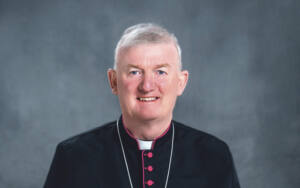
WelCom March 2024
Bishop John Adams, Bishop of Palmerston North
In recent times there has been a question in front of the western world, which has demanded our attention. Debates have been lively with strong opinions on both sides. Just recently, this same contentious issue flared up again, and once again there was plenty of public discussion about it. The issue: which is the better movie – Barbie vs Oppenheimer? Yes, it was all over our TV screens and social media. Barbie vs Oppenheimer the defining question of the age.
I’m not sure where you may sit on this question. For me, I haven’t seen either movie so I feel unable to deliberate. However, the recent release of Oppenheimer did prompt me to do some reading about the man at the centre of this movie, Robert Oppenheimer, the American theoretical physicist who is credited with researching and designing the first atomic bomb.
In the midst of my reading, I did of course stumble upon the genuinely important debate surrounding the bombing of Hiroshima and Nagasaki. You may know that the dropping of the first nuclear bomb was justified by the then American president, Harry Truman, the 33rd President of the United States, who claimed the bombing of these two cites was justified by its bringing about of an early end to the Second World War.
Let’s not delve too deeply into the veracity of that claim, some facts are clear; we know around 80,000 died instantly at Hiroshima, with tens of thousands of others dying later of radiation. Hiroshima was not a military centre, and lacked major war industries. There were some minor light industries on the periphery of the city. Those who targeted Hiroshima ensured the aiming point should be the centre of the city and not the outskirts, giving the lie to Truman’s diary entry that ‘The target will be a purely military one’.
A question for me was, at the time, was there any offering from a Roman Catholic standpoint, in the debate concerning moral good or otherwise of the decision to bomb those two cities?
It turns out that yes there was, the Catholic philosopher Elizabeth Anscombe authored a pamphlet entitled Mr Truman’s Degree, strongly objecting to Oxford University’s awarding of an honorary degree to the former president, because of her opposition to President Truman’s decision to bomb these Japanese cities. Anscombe sought to defend the traditional Catholic view that there are some moral choices which are, in and of themselves, prohibited.
Elizabeth Anscombe accused President Truman of crude consequentialist reasoning, she claimed further that it is a moral ‘given’ that choosing to kill an innocent, as a means to your ends, is always murder. The people of Hiroshima and Nagasaki were clearly innocent in this sense. The clear and immediate intention of the bomber pilots, and those who ordered the bombing, was to obliterate huge numbers of Japanese people as means to their further aim of bringing about Japanese surrender.
You see intentions matter: they help form our characters in a special, lasting way. This includes not only our ultimate intentions, but all the means we choose to achieve these. Causing bad side-effects is not always avoidable: in fact we all cause these by many things we do. However, intending certain bad effects is to be avoided. Most of us, I’m guessing, will concede there is a difference between war crimes such as the targeting of civilians, and the acceptance of the unavoidable loss of combatants in the theatre of war. Though even this latter concession must always be proportionate to the threat identified.
Many of you will of course be aware that this same consequentialist argument is being used today on several fronts, most obviously in defence of the military action currently taking place in Gaza and in the Ukraine. Innocent people are losing their lives because military and political leaders see them as being expendable in the light of a supposedly greater cause.
This is never morally acceptable.
St Pope John Paul II was clear about this in his great encyclical Veritatis Splendour, in which he claims we can know, and apply universal moral norms. I am sure that this is true.
I mention all this to you today with a broader thought in the back of my mind – and it is this, we need places which foster and protect the great Catholic intellectual tradition, we need places that value the great heritage of Catholic learning, not as some museum piece but as an understanding of the Gospel that the world so desperately needs to hear today. For me personally the courage and Catholic insight of Elizabeth Anscombe has helped me enormously to negotiate the complex and so often flawed world of ethical consequentialist thinking.
Oppenheimer or Barbie, perhaps that question remains unresolved, is there a place for the Roman Catholic thought in the public square today? Yes, most certainly.
Source reference: The Catholic Herald, 24 July 2023.